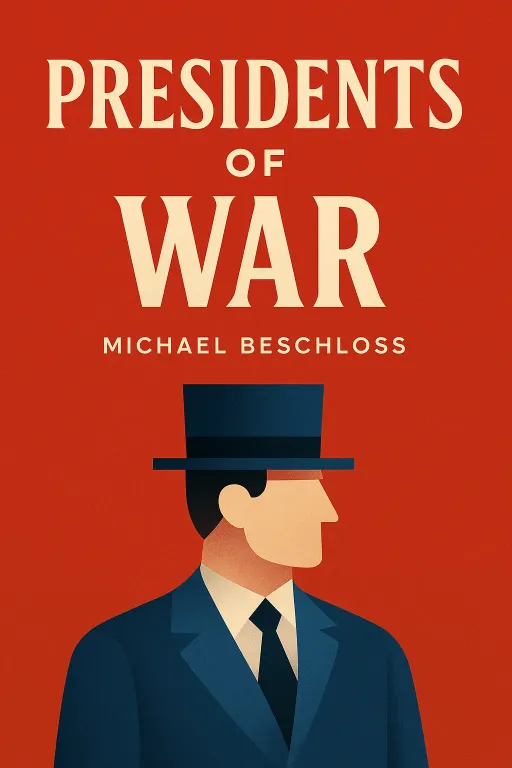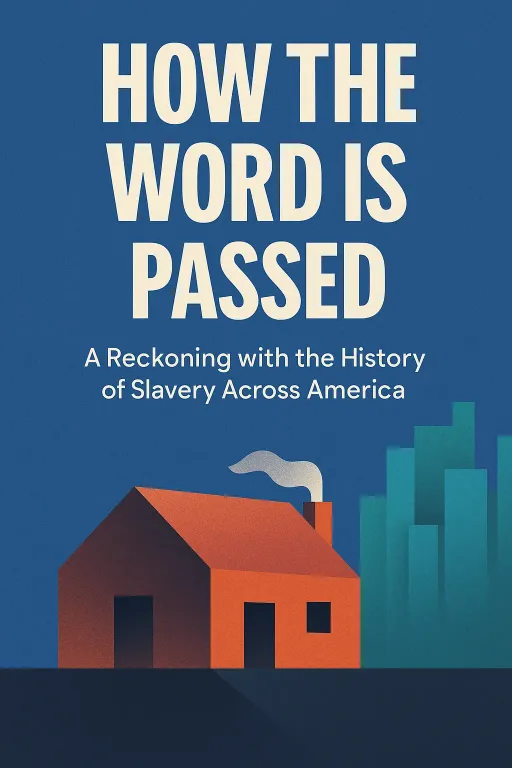
Presidents of War
11 minIntroduction
Narrator: Imagine the scene: August 24th, 1814. The President of the United States, James Madison, is a fugitive in his own country. From a safe distance across the Potomac River, he watches as Washington D.C. is engulfed in flames. The Capitol, the White House, the symbols of a young democracy, are being systematically torched by invading British forces. This wasn't just a military defeat; it was a profound humiliation, a moment that pushed the American experiment to the brink of collapse. How could the architect of the Constitution, a man deeply wary of executive power and the dangers of war, find himself leading a divided nation into a conflict that brought enemy troops to the very heart of its government?
This harrowing moment is the starting point for Michael Beschloss's book, Presidents of War. It explores the immense pressures, personal struggles, and historical consequences that unfold when American presidents lead the nation into armed conflict, revealing how the character of a single individual can shape the destiny of millions.
The Founders' Fear and Madison's Dilemma
Key Insight 1
Narrator: The U.S. Constitution was designed with a deep-seated fear of unchecked power, especially when it came to war. The Founders, having just escaped the rule of a king, were determined to prevent any single person from having the authority to plunge the nation into conflict. As James Madison himself wrote, the executive is the branch of government "most interested in war, & most prone to it." He believed with "studied care" that the power to declare war had been vested in the legislature, in Congress. Yet, in 1812, it was President Madison who led the country into its first major war under that very Constitution.
The burning of Washington in 1814 became the ultimate symbol of this paradox. As British troops marched on the capital, Madison’s own Secretary of War proved incompetent, and the city’s defenses crumbled. While the President was in the field reviewing the disorganized militia, his wife, Dolley Madison, became the hero of the hour. With the enemy approaching, she refused to flee the Executive Mansion until she had secured a full-length portrait of George Washington, a vital symbol of the revolution. She famously ordered, "Save that picture!…If not possible, destroy it!" ensuring it would not become a British trophy. Soon after she escaped, British soldiers were feasting on the dinner she had set for the President before setting the mansion ablaze. Madison, forced to flee, became a leader in exile, facing not just a foreign enemy but also the scorn of his own citizens, some of whom threatened violence against the man they blamed for their suffering. This moment crystallized the Founders' greatest fear: a nation torn apart by a war of choice, with its leader's authority in tatters.
The Spark of War and a Reluctant President
Key Insight 2
Narrator: The road to the War of 1812 was paved years earlier, during the presidency of Thomas Jefferson. In June 1807, an event known as the Chesapeake-Leopard affair brought the United States and Great Britain to the brink of war. The American frigate, USS Chesapeake, had just left Norfolk, Virginia, when it was confronted by the British warship, HMS Leopard. The British captain demanded to search the American ship for deserters from the Royal Navy. When the American commander, James Barron, refused, the Leopard unleashed a devastating series of broadsides. The Chesapeake was completely unprepared for battle; its decks were cluttered with supplies, and its guns were not ready. It managed to fire only a single shot in defiance before surrendering.
The attack was a national outrage. As Jefferson noted, "Never since the battle of Lexington, have I seen this country in such a state of exasperation." The public clamored for war. Yet, Jefferson, a man who believed a large navy was a "ruinous folly," resisted. He had spent his presidency slashing the military budget in favor of small, cheap gunboats that proved largely ineffective. Instead of war, he chose economic coercion, enacting the Embargo Act, which prohibited American ships from trading with foreign nations. The policy was a catastrophic failure. It crippled the American economy, causing widespread suffering and anger, with one Bostonian writing to the President, "You Infernal Villain…How much longer are you going to keep this damned Embargo on to starve us poor people?" While Jefferson successfully kept the nation out of a full-blown war, he handed his successor, James Madison, a nation that was economically wounded, militarily weak, and simmering with unresolved grievances against Britain.
Diplomatic Blunders and the Rise of the War Hawks
Key Insight 3
Narrator: When James Madison took office, he inherited a diplomatic minefield. His first major attempt to resolve the crisis with Britain ended in humiliation. He struck a deal with the British minister, David Erskine, to end the trade restrictions, and American ports joyfully reopened. But Erskine had overpromised, and his government back in London swiftly rejected the agreement, making Madison look like a fool. The British then sent a new envoy, Francis "Copenhagen" Jackson, a man known for his arrogance and his role in the brutal bombardment of the Danish capital. Jackson proceeded to insult Madison and his administration, effectively accusing them of duplicity. Diplomatic relations completely collapsed.
This series of failures weakened Madison's position and fueled a new, aggressive faction in Congress known as the "War Hawks." Led by the charismatic young Speaker of the House, Henry Clay, these men argued that diplomacy had failed and that war was the only way to defend American honor, stop the British practice of impressing American sailors, and end British support for Native American resistance on the western frontier. Clay delivered impassioned speeches, declaring he preferred "the troubled ocean of war, demanded by the honor and independence of the country…to the tranquil, putrescent pool of ignominious peace." The pressure mounted on Madison. Incidents like the clash between the USS President and the British sloop Little Belt, and the Battle of Tippecanoe, where American forces fought a confederacy of tribes armed with British weapons, pushed the nation ever closer to the edge. Madison, a man of peace and intellect, found himself cornered by public opinion and a Congress hungry for a fight.
A Disastrous War and an Unlikely Victory
Key Insight 4
Narrator: The War of 1812 began with misplaced American optimism. The War Hawks believed the conquest of Canada would be a simple matter. It was not. The first major campaign was a disaster. General William Hull, leading an American army into Canada, seemed paralyzed by indecision and fear. After a brief and ineffective invasion, he retreated to Fort Detroit and, in a moment of "shameful, inglorious" cowardice, surrendered his entire army of nearly 2,000 men without a fight. The news sent shockwaves of indignation across the country.
The war effort was plagued by incompetence, logistical failures, and deep political division. New England Federalists, whose economy was tied to British trade, openly opposed "Mr. Madison's War," refusing to send militia and even threatening secession. While the young U.S. Navy achieved stunning victories at sea, like the USS Constitution's defeat of the HMS Guerriere, the land campaigns continued to falter. The low point was the burning of Washington in 1814. Yet, from these ashes of humiliation, a new national spirit began to emerge. The successful defense of Baltimore's Fort McHenry, which inspired Francis Scott Key to write "The Star-Spangled Banner," provided a much-needed morale boost. Then came news of General Andrew Jackson's astonishing victory at the Battle of New Orleans. Although the battle was fought after the peace treaty had already been signed in Ghent, it created an overwhelming sense of American triumph. The war that had begun in disgrace and divided the nation ended in a wave of patriotic fervor, solidifying a new American identity and salvaging Madison's legacy.
Conclusion
Narrator: Ultimately, Presidents of War reveals that the War of 1812 was a crucible for the American presidency and the nation itself. The conflict tested the constitutional separation of powers to its absolute limit, forcing a president who championed legislative authority to wield executive power in ways he never anticipated. James Madison, the reluctant warrior, presided over a conflict marked by stunning failures and deep internal dissent, yet he managed to navigate the crisis without sacrificing the civil liberties he held so dear—a stark contrast to later wartime presidents.
The book’s most powerful takeaway is that the war, while officially ending in a stalemate, was reframed in the American consciousness as a second war of independence. It forged a sense of national character and proved that the young republic could survive a profound crisis. It leaves us with a challenging question that echoes through American history: How do we balance the constitutional ideal of shared responsibility for war with the immense pressure placed on a single commander-in-chief during times of crisis? The struggles of James Madison show that this is not just a legal question, but a deeply human one, shaped by the character, principles, and fortitude of the person in the Oval Office.









